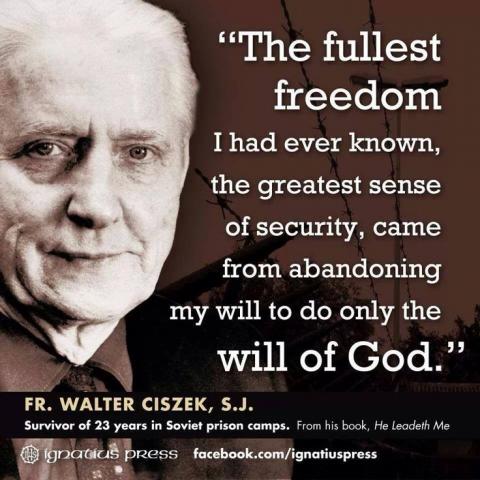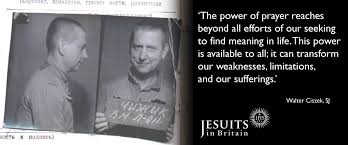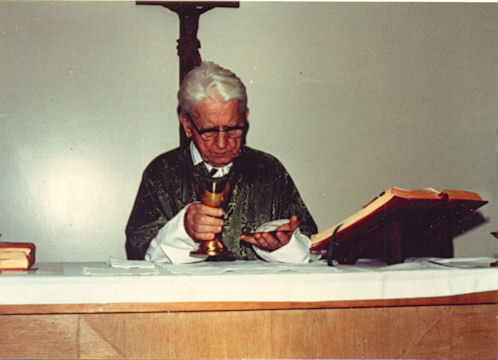Servant of God Walter Ciszek, SJ
Born: November 4, 1904
Died: December 8, 1984
 Walter Ciszek was born in the small mining town of Shenandoah, Pennsylvania, to Polish immigrants who had emigrated to the United States in the 1890s. He studied at St Casmir’s parochial school and enjoyed more fun than books. A former gang member, he shocked his family by deciding to become a priest. His father nevertheless arranged for him to do his high school studies at Sts Cyril and Methodius Seminary in Orchard Lake, Michigan . While staying on to continue his college years, Walter read the life of St Stanislaus Kostka, whose courage and determination so inspired him that during his final year’s annual retreat, given by a Jesuit, he decided to enter the Society without seeking anyone’s advice. He wrote to the Jesuits in Warsaw, Poland, asking to be admitted and was in turn advised to contact the Jesuits in New York City. During the 1928 summer vacation, Walter travelled to New York to see the Jesuit provincial who interviewed him and told him to return home to await a letter. He was accepted and was asked to report to the novitiate of St Andrew-on-Hudson at Poughkeepsie, New York in 1928. As he was always doing things totally on his own, he notified his parents that he was entering the Jesuits on the morning he was leaving home. He was twenty-four and knew what he wanted.
Walter Ciszek was born in the small mining town of Shenandoah, Pennsylvania, to Polish immigrants who had emigrated to the United States in the 1890s. He studied at St Casmir’s parochial school and enjoyed more fun than books. A former gang member, he shocked his family by deciding to become a priest. His father nevertheless arranged for him to do his high school studies at Sts Cyril and Methodius Seminary in Orchard Lake, Michigan . While staying on to continue his college years, Walter read the life of St Stanislaus Kostka, whose courage and determination so inspired him that during his final year’s annual retreat, given by a Jesuit, he decided to enter the Society without seeking anyone’s advice. He wrote to the Jesuits in Warsaw, Poland, asking to be admitted and was in turn advised to contact the Jesuits in New York City. During the 1928 summer vacation, Walter travelled to New York to see the Jesuit provincial who interviewed him and told him to return home to await a letter. He was accepted and was asked to report to the novitiate of St Andrew-on-Hudson at Poughkeepsie, New York in 1928. As he was always doing things totally on his own, he notified his parents that he was entering the Jesuits on the morning he was leaving home. He was twenty-four and knew what he wanted.
After a few months the novice master came to the decision that Walter was not cut out to be a Jesuit and suggested that he return home but the latter was determined and he convinced the master to let him remain. The following year, he volunteered to serve as a missionary to Russia in response to Pope Piux XI’s appeal to Jesuits to study at the new Russian Centre in Rome and to prepare for missionary work in Russia. However his novice master thought he should wait until he had pronounced his first vows. Walter pronounced his first vows on September 8, 1930 and immediately wrote to the Jesuit general to volunteer for the Russian mission. He was accepted but was told to continue his studies until further notification. It was while in Woodstock College in Maryland where he was doing his philosophy that his summons came. In 1934 after completing his philosophy he left for Rome and began his theology at Rome’s Gregorian University and his Russian studies at the Russicum and was ordained in Rome on June 24, 1937.
In 1938, Fr. Ciszek was sent to the Jesuit mission in Albertyn in eastern Poland. With the outbreak of war in 1939, the Soviet Union occupied eastern Poland and forced Fr Ciszek to close his mission. He decided to go further into the country and minister to the spiritual needs of its Catholics. With his superior’s permission he took on the identity of Vladimir Lypinski, a widower, without a family, signed up with a lumber company to work in the logging town of Chusovoy in the Urals on March 19, 1940 with two of his Jesuits. To get to there they had to travel 2400 km by train. For the next fourteen months Fr Ciszek worked in lumber camps, hauling and stacking lumber or as a truck driver while discreetly performing religious ministry at the same time. The daily wage was just enough to buy a small loaf of bread. To celebrate Mass he had to go to the forest where he would not be disturbed.
 On June 22, 1941, Germany invaded Russia and early the next morning, Fr Ciszek was arrested under accusations of espionage for the Vatican and sent to the infamous Lubyanka prison in Moscow, operated by the internal security agency. In 1942, he was convicted of espionage and was sentenced to 15 years hard labour. He was kept in solitary confinement until 1944 and although the war had ended in May 1945 he remained there until June 1946 when he began his sentence of hard labour in Siberia with other prisoners of war. There, Fr Ciszek was forced to shovel coal onto freighter vessels, and later was transferred to work in coal mines. A year later, he was sent to work in construction at an ore processing plant. From 1953 to 1955, he worked in mines. His memoirs provide a vivid description of the revolts that spread through the prisoners’ camps in the aftermath of Stalin’s death. Throughout his lengthy imprisonment, Fr. Ciszek continued to pray, to celebrate Mass, hear confessions, conduct retreats and perform parish ministry. Until he was allowed to write to America in 1955, he was presumed dead by both his family and the Jesuit order. By April 22, 1955 his hard labor sentence was complete, and he was released with restrictions in the city of Norilsk. At this time, he was finally able to write to his sisters in the United States.
On June 22, 1941, Germany invaded Russia and early the next morning, Fr Ciszek was arrested under accusations of espionage for the Vatican and sent to the infamous Lubyanka prison in Moscow, operated by the internal security agency. In 1942, he was convicted of espionage and was sentenced to 15 years hard labour. He was kept in solitary confinement until 1944 and although the war had ended in May 1945 he remained there until June 1946 when he began his sentence of hard labour in Siberia with other prisoners of war. There, Fr Ciszek was forced to shovel coal onto freighter vessels, and later was transferred to work in coal mines. A year later, he was sent to work in construction at an ore processing plant. From 1953 to 1955, he worked in mines. His memoirs provide a vivid description of the revolts that spread through the prisoners’ camps in the aftermath of Stalin’s death. Throughout his lengthy imprisonment, Fr. Ciszek continued to pray, to celebrate Mass, hear confessions, conduct retreats and perform parish ministry. Until he was allowed to write to America in 1955, he was presumed dead by both his family and the Jesuit order. By April 22, 1955 his hard labor sentence was complete, and he was released with restrictions in the city of Norilsk. At this time, he was finally able to write to his sisters in the United States.
In 1958, he was ordered by the KGB to move to Krasnoyarsk, where he secretly established mission parishes. After the KGB learned of this, he was forcibly transferred to Abakan, 160 km to the south, where he worked as an automobile mechanic for four more years.
In 1963, he finally received a letter from his sisters in the U.S. Several months later, the Soviet Union decided to return him to the United States in exchange for two Soviet agents. He was not informed of this until he was delivered to an official of the U.S. State Department and told he was still an American citizen.
 After his return, Fr Ciszek was quoted as stating, “I am an American and happy to be home, but in many ways I am almost a stranger.” In 1965, he began working and lecturing at the John XXIII Center at Fordham University counseling and offering spiritual direction to those who visited him, until his death on December 8, 1984 at the age of eighty.
After his return, Fr Ciszek was quoted as stating, “I am an American and happy to be home, but in many ways I am almost a stranger.” In 1965, he began working and lecturing at the John XXIII Center at Fordham University counseling and offering spiritual direction to those who visited him, until his death on December 8, 1984 at the age of eighty.
Fr. Ciszek was laid to rest at the Jesuit Cemetery in Wernersville, Pennsylvania . His cause for beatification is now under consideration by Rome.
